List of Nepenthes species
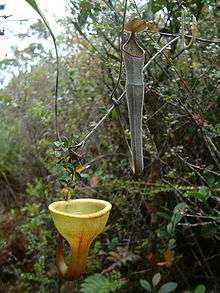
This list of Nepenthes species is a comprehensive listing of all known species of the carnivorous plant genus Nepenthes. It includes 164 recognised extant species, 3 incompletely diagnosed taxa, and 3 nothospecies. Three possible extinct species are also covered.
The official IUCN conservation status of each species is taken from the latest edition of the IUCN Red List.[1] Unofficial assessments based on the IUCN criteria are also included, but are presented in italics. Unless otherwise noted, taxonomic determinations and all other information are sourced from Stewart McPherson's two-volume Pitcher Plants of the Old World, published in 2009.[2] Where recent literature provides an altitudinal distribution that falls outside the range given in Pitcher Plants of the Old World, the discrepancy is noted.
All major islands within a species's geographic range are included. Smaller surrounding islands are listed separately under "Minor islands", though these lists are not exhaustive. In the case of archipelagos such as the Philippines, the individual islands to which the species is native are shown in brackets.
Authorities are presented in the form of a standard author citation, using abbreviations specified by the International Plant Names Index.[3] Years given denote the year of the species's formal publication under the current name, thus excluding the earlier basionym date of publication if one exists.
Extant species
Incompletely diagnosed taxa
The following undescribed taxa are taken from Pitcher Plants of the Old World and its supplementary volume, New Nepenthes, published in 2011.[48]
| Taxon | Image | Distribution | Altitudinal distribution |
|---|---|---|---|
| Nepenthes sp. Anipahan[83] | Philippines (Palawan)[83] | 1200–1400 m[83] | |
| Nepenthes sp. Luzon[84] | Philippines (Luzon)[84] | 1220 m[84] | |
| Nepenthes sp. Misool |  | Raja Ampat Islands (Misool) | 0–30 m |
Nothospecies
Matthew Jebb and Martin Cheek recognised the following three nothospecies in their monographs on the genus ("A skeletal revision of Nepenthes (Nepenthaceae)" (1997) and "Nepenthaceae" (2001)). In the recent literature, these taxa have generally been treated as natural hybrids rather than as species.[2][17][23][24] Of the three, N. × kinabaluensis has the strongest claim to species status, as it grows in two large, self-sustaining populations independent of its putative parent species.[23][85] These populations are reportedly true breeding.[23] Jumaat Haji Adam and C. C. Wilcock advocated the recognition of N. × kinabaluensis as a species in a 1998 article.[86]
| Nothospecies | Parent species | Authority | Year | Image | Distribution | Altitudinal distribution | IUCN conservation status |
|---|---|---|---|---|---|---|---|
| Nepenthes × hookeriana | N. ampullaria × N. rafflesiana | Hort.Veitch ex Mast. | 1881 |  | Borneo, Peninsular Malaysia, Singapore, Sumatra[36] | 0–450 m[7] | Least Concern[19] |
| Nepenthes × kinabaluensis | N. rajah × N. villosa | Sh.Kurata ex Sh.Kurata | 1984 | | Borneo[36] | 2420–3030 m[36] | Endangered[19] |
| Nepenthes × trichocarpa | N. ampullaria × N. gracilis | Miq. | 1858 | 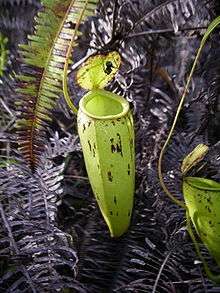 | Borneo, Peninsular Malaysia, Singapore, Sumatra,[36] Thailand[73] | 0–800 m[23] | Least Concern[19] |
Extinct species
Fossil pollen of various provenance, much of it originally described under the form taxon Droseridites, has been tentatively assigned to Nepenthes by several authors.[87][88][89] The following three species were transferred to the genus Nepenthes by Wilfried Krutzsch in 1985.[87]
| Species | Authority | Year | Location | Age |
|---|---|---|---|---|
| Nepenthes echinatus | (Hunger) Krutzsch | 1985 | Europe | Palaeocene |
| Nepenthes echinosporus | (R.Potonié) Krutzsch | 1985 | Europe | Palaeocene |
| Nepenthes major | (Krutzsch) Krutzsch | 1985 | Europe | Palaeocene |
Some authors consider Droseridites major and D. parvus as synonyms of Nepenthidites laitryngewensis.[90][91]
Pollen from the Kerguelen Islands originally described as D. spinosus has also been interpreted as belonging to Nepenthes.[92]
See also
Notes
- 1 2 Under the narrow circumscription of Cheek & Jebb (2013), N. alata is restricted to northern Luzon, with the more southerly plants previously referred to this species actually representing N. graciliflora, N. negros, and N. ramos.[6] This N. alata sensu stricto has an altitudinal distribution of 550 m and above.[6]
- ↑ Adam, Wilcock & Swaine (1992) give an upper altitudinal limit of 1200 m for N. albomarginata.[7]
- ↑ Adam, Wilcock & Swaine (1992) cite a record of N. bicalcarata from Mount Periok in Brunei at c. 1600 m.[7]
- ↑ Cheek & Jebb (2001) give a range of 780–1880 m for N. boschiana,[23] while Clarke (1997) gives a range of 900–1880 m.[24]
- ↑ Cheek & Jebb (2001) give an upper altitudinal limit of 2250 m for N. burbidgeae,[23] while Adam, Wilcock & Swaine (1992) give a range of 1100–2300 m.[7]
- ↑ Cheek & Jebb (2001), Clarke (1997) and Adam, Wilcock & Swaine (1992) give a lower altitudinal limit of 1500 m for N. edwardsiana.[7][23][24]
- ↑ Cheek & Jebb (2001) give a lower altitudinal limit of 1000 m for N. ephippiata.[23] The species has reportedly been collected from Bukit Raya at 2000–2270 m.[7][33]
- ↑ Adam, Wilcock & Swaine (1992) give an upper altitudinal limit of 1700 m for N. gracilis.[7]
- ↑ Adam, Wilcock & Swaine (1992) give a range of 150–1500 m for N. hirsuta,[7] while Mansur & Brearley (2008) report finding it at elevations as low as 160 m.[44]
- ↑ Cheek & Jebb (2001) give a lower altitudinal limit of 1600 m for N. lowii,[23] while Adam, Wilcock & Swaine (1992) give a range of 900–3400 m.[7]
- ↑ The lower altitudinal limit of 2000 m given for N. macrophylla in some older sources[53] is apparently incorrect.[2][54]
- ↑ Adam, Wilcock & Swaine (1992) give a lower altitudinal limit of 250 m for N. macrovulgaris.[7]
- ↑ Adam, Wilcock & Swaine (1992) give an upper altitudinal limit of 1500 m for N. rafflesiana.[7]
- ↑ Rybka, Rybková & Cantley (2005) give a range of 1200–1800 m for N. sibuyanensis,[70] while the authors of the describing paper give a range of 1500–1800 m.[71]
- ↑ Mansur & Brearley (2008) report finding N. stenophylla at 400 m.[44]
- ↑ Nepenthes surigaoensis may grow as high as 1750 m ("5750 feet" in the original) according to the describing author, Adolph Daniel Edward Elmer.[76]
- ↑ Cheek & Jebb (2001) give an upper altitudinal limit of 2750 m for N. tobaica.[23]
- ↑ Cheek & Jebb (2001) give an upper altitudinal limit of 500 m for N. treubiana.[23]
- ↑ The upper altitudinal limit of 400 m is uncertain as it is based on the figure given on Google Earth for an "inexact grid-reference" associated with a herbarium specimen.[79]
- ↑ Nepenthes villosa generally grows at elevations of 2300–3240 m, but is more common at 1600–1900 m on Mount Tambuyukon.[2] Adam, Wilcock & Swaine (1992) give an upper altitudinal limit of 3400 m for this species.[7]
References
- ↑ IUCN 2009. Nepenthes. In: IUCN Red List of Threatened Species. Version 2009.1. IUCN.
- 1 2 3 4 McPherson, S.R. 2009. Pitcher Plants of the Old World. 2 volumes. Redfern Natural History Productions, Poole.
- ↑ Author Query. International Plant Names Index.
- 1 2 3 4 5 6 Cheek, M. & M. Jebb 2013. Identification and typification of Nepenthes blancoi, with N. abalata sp. nov. from the western Visayas, Philippines. Nordic Journal of Botany 31(2): 151–156. doi:10.1111/j.1756-1051.2012.00012.x
- 1 2 3 4 5 6 7 8 9 10 11 12 Cheek, M. & M. Jebb 2013. The Nepenthes micramphora (Nepenthaceae) group, with two new species from Mindanao, Philippines. Phytotaxa 151(1): 25–34. doi:10.11646/phytotaxa.151.1.2
- 1 2 3 4 5 6 7 8 9 10 11 12 13 Cheek, M. & M. Jebb 2013. Typification and redelimitation of Nepenthes alata with notes on the N. alata group, and N. negros sp. nov. from the Philippines. Nordic Journal of Botany 31(5): 616–622. doi:10.1111/j.1756-1051.2012.00099.x
- 1 2 3 4 5 6 7 8 9 10 11 12 Adam, J.H., C.C. Wilcock & M.D. Swaine 1992. The ecology and distribution of Bornean Nepenthes. Journal of Tropical Forest Science 5(1): 13–25.
- 1 2 3 4 5 Cheek, M. & M. Jebb 2013. Nepenthes alzapan (Nepenthaceae), a new species from Luzon, Philippines. Phytotaxa 100(1): 57–60. doi:10.11646/phytotaxa.100.1.6
- 1 2 3 4 (Indonesian) Mansur, M. 2012. Keanekaragaman jenis tumbuhan pemakan serangga dan laju fotosintesisnya di Pulau Natuna. [Diversity on insectivorous plants and its photosynthetic rate in Natuna Island.] Berita Biologi 11(1): 33–42. Abstract
- 1 2 3 4 5 Clarke, C.M. 2001. Appendix C: Distribution Maps. In: Nepenthes of Sumatra and Peninsular Malaysia. Natural History Publications (Borneo), Kota Kinabalu. pp. 299–307.
- 1 2 3 4 Catalano, M. 2010. Nepenthes andamana M. Catal. sp. nov. In: Nepenthes della Thailandia: Diario di viaggio. Prague. p. 34.
- ↑ McPherson, S.R. 2010. Carnivorous Plants and their Habitats. 2 volumes. Redfern Natural History Productions, Poole.
- 1 2 3 4 5 6 Lee, C.C., G. Bourke, W. Taylor, S.T. Yeo & K. Rembold 2011. Nepenthes appendiculata, a new pitcher plant from Sarawak. In: McPherson, S.R. New Nepenthes: Volume One. Redfern Natural History Productions, Poole. pp. 24–35.
- ↑ Nepenthes armin Jebb & Cheek. International Plant Names Index (IPNI).
- 1 2 3 4 5 6 McPherson, S.R. & V.B. Amoroso 2011. Field Guide to the Pitcher Plants of the Philippines. Redfern Natural History Productions, Poole.
- 1 2 3 4 5 Cheek, M., D.N. Tandang & P.B. Pelser 2015. Nepenthes barcelonae (Nepenthaceae), a new species from Luzon, Philippines. Phytotaxa 222(2): 145–150. doi:10.11646/phytotaxa.222.2.7
- 1 2 3 4 5 Clarke, C.M. 2001. Nepenthes of Sumatra and Peninsular Malaysia. Natural History Publications (Borneo), Kota Kinabalu.
- ↑ McPherson, S.R. & A. Robinson 2012. Field Guide to the Pitcher Plants of Sumatra and Java. Redfern Natural History Productions, Poole.
- 1 2 3 4 5 6 7 8 9 10 11 12 13 von Arx, B., J. Schlauer & M. Groves 2001. CITES Carnivorous Plant Checklist. The Cromwell Press, United Kingdom.
- 1 2 3 McPherson, S.R. & A. Robinson 2012. Field Guide to the Pitcher Plants of Peninsular Malaysia and Indochina. Redfern Natural History Productions, Poole.
- ↑ Clarke, C. & C.C. Lee 2012. A revision of Nepenthes (Nepenthaceae) from Gunung Tahan, Peninsular Malaysia. Gardens' Bulletin Singapore 64(1): 33–49.
- 1 2 3 4 5 6 7 Cheek, M.R. & M.H.P. Jebb 2009. Nepenthes group Montanae (Nepenthaceae) in Indo-China, with N. thai and N. bokor described as new. Kew Bulletin 64(2): 319–325. doi:10.1007/s12225-009-9117-3
- 1 2 3 4 5 6 7 8 9 10 11 Cheek, M.R. & M.H.P. Jebb 2001. Nepenthaceae. Flora Malesiana 15: 1–157.
- 1 2 3 Clarke, C.M. 1997. Nepenthes of Borneo. Natural History Publications (Borneo), Kota Kinabalu.
- 1 2 Clarke, C., C.C. Lee & V. Enar 2014. Observations of the natural history and ecology of Nepenthes campanulata. Carnivorous Plant Newsletter 43(1): 7–13.
- 1 2 3 4 5 Gronemeyer, T., F. Coritico, M. Micheler, D. Marwinski, R. Acil & V. Amoroso 2011. Nepenthes ceciliae, a new pitcher plant species from Mount Kiamo, Mindanao. In: McPherson, S.R. New Nepenthes: Volume One. Redfern Natural History Productions, Poole. pp. 412–423.
- 1 2 3 4 5 Catalano, M. 2010. Nepenthes chang M. Catal. sp. nov. In: Nepenthes della Thailandia: Diario di viaggio. Prague. p. 38.
- ↑ Co, L. & W. Suarez 2013. Nepenthaceae. Co's Digital Flora of the Philippines.
- ↑ Macfarlane, J.M. 1927. The Philippine species of Nepenthes. The Philippine Journal of Science 33(2): 127–140.
- ↑ Heinrich, V.B. 2009. Philippines: Volcanoes Nepenthes and more. Carnivorous Plants in the tropics, October 28, 2009.
- 1 2 3 4 5 6 7 8 9 10 11 12 13 14 15 16 17 18 19 20 21 Gronemeyer, T., F. Coritico, A. Wistuba, D. Marwinski, T. Gieray, M. Micheler, F.S. Mey & V. Amoroso 2014. Four new species of Nepenthes L. (Nepenthaceae) from the central mountains of Mindanao, Philippines. Plants 3(2): 284–303. doi:10.3390/plants3020284
- 1 2 3 4 5 6 7 8 9 10 11 12 13 Cheek, M. 2015. Nepenthes (Nepenthaceae) of Halmahera, Indonesia. Blumea 59: 215–225. doi:10.3767/000651915X689091
- ↑ Nooteboom, H.P. (ed.) 1987. Report of the 1982–1983 Bukit Raya Expedition. Rijksherbarium, Leiden.
- 1 2 3 4 5 Robinson, A.S., J. Nerz & A. Wistuba 2011. Nepenthes epiphytica, a new pitcher plant from East Kalimantan. In: McPherson, S.R. New Nepenthes: Volume One. Redfern Natural History Productions, Poole. pp. 36–51.
- 1 2 3 4 5 6 7 8 9 10 11 12 13 14 15 16 17 18 19 20 21 22 23 24 25 Cheek, M. & M. Jebb 2013. Recircumscription of the Nepenthes alata group (Caryophyllales: Nepenthaceae), in the Philippines, with four new species. European Journal of Taxonomy 69: 1–23. doi:10.5852/ejt.2013.69
- 1 2 3 4 5 6 Phillipps, A., A. Lamb & C.C. Lee 2008. Pitcher Plants of Borneo. Second Edition. Natural History Publications (Borneo), Kota Kinabalu.
- 1 2 3 4 5 McPherson, S., J. Cervancia, C. Lee, M. Jaunzems, A. Fleischmann, F. Mey, E. Gironella & A. Robinson 2010. Nepenthes gantungensis (Nepenthaceae), a new pitcher plant species from Mount Gantung, Palawan, Philippines. In: S.R. McPherson Carnivorous Plants and their Habitats. Volume 2. Redfern Natural History Productions, Poole. pp. 1286–1295.
- ↑ (Indonesian) Hidayat, S., J. Hidayat, Hamzah, E. Suhandi, Tatang & Ajidin 2003. Analisis vegetasi dua jenis tumbuhan pemakan serangga di Padang Pinang Anyang, Pulau Belitung. [Vegetation analysis of two insectivorous plants in Padang Pinang Anyang, Belitung Island.] Biodiversitas 4(2): 93–96.
- 1 2 Burbidge, F.W. 1882. Notes on the new Nepenthes. The Gardeners' Chronicle, new series, 17(420): 56.
- 1 2 3 4 5 6 Gronemeyer, T., A. Wistuba, V. Heinrich, S. McPherson, F. Mey & A. Amoroso 2010. Nepenthes hamiguitanensis (Nepenthaceae), a new pitcher plant species from Mindanao Island, Philippines. In: S.R. McPherson Carnivorous Plants and their Habitats. Volume 2. Redfern Natural History Productions, Poole. pp. 1296–1305.
- 1 2 3 4 Scharmann, M. & T.U. Grafe 2013. Reinstatement of Nepenthes hemsleyana (Nepenthaceae), an endemic pitcher plant from Borneo, with a discussion of associated Nepenthes taxa. Blumea 58(1): 8–12. doi:10.3767/000651913X668465
- ↑ McPherson, S.R. & A. Robinson 2012. Field Guide to the Pitcher Plants of Borneo. Redfern Natural History Productions, Poole.
- ↑ Clarke, C., J.A. Moran & C.C. Lee 2011. Nepenthes baramensis (Nepenthaceae) – a new species from north-western Borneo . Blumea 56(3): 229–233. doi:10.3767/000651911X607121
- 1 2 Mansur, M. & F.Q. Brearley 2008. Ecological studies on Nepenthes at Barito Ulu, Central Kalimantan, Indonesia. Jurnal Teknologi Lingkungan 9(3): 271–276.
- 1 2 3 4 5 6 Mey, F.S., M. Catalano, C. Clarke, A. Robinson, A. Fleischmann & S. McPherson 2010. Nepenthes holdenii (Nepenthaceae), a new species of pyrophytic pitcher plant from the Cardamom Mountains of Cambodia. In: S.R. McPherson Carnivorous Plants and their Habitats. Volume 2. Redfern Natural History Productions, Poole. pp. 1306–1331.
- 1 2 3 Hernawati & P. Akhriadi 2006. A Field Guide to the Nepenthes of Sumatra. PILI-NGO Movement, Bogor.
- 1 2 3 Catalano, M. 2010. Nepenthes kerrii M. Catal. et T. Kruetr. sp. nov. In: Nepenthes della Thailandia: Diario di viaggio. Prague. p. 32.
- 1 2 3 4 McPherson, S.R. 2011. New Nepenthes: Volume One. Redfern Natural History Productions, Poole.
- 1 2 McPherson, S.R. & A. Robinson 2012. Field Guide to the Pitcher Plants of Australia and New Guinea. Redfern Natural History Productions, Poole.
- 1 2 (Italian) Catalano, M. 2015. Nepenthes kongkandana, da ufficiosa ad ufficiale. AIPC Magazine 37: 4–11.
- 1 2 3 4 5 6 Robinson, A., J. Nerz, A. Wistuba, M. Mansur & S. McPherson 2011. Nepenthes lamii Jebb & Cheek, an emended description resulting from the separation of a two-species complex, and the introduction of Nepenthes monticola, a new species of highland pitcher plant from New Guinea. In: McPherson, S.R. New Nepenthes: Volume One. Redfern Natural History Productions, Poole. pp. 522–555.
- 1 2 3 4 5 McPherson, S., G. Bourke, J. Cervancia, M. Jaunzems, E. Gironella, A. Robinson & A. Fleischmann 2011. Nepenthes leonardoi (Nepenthaceae), a new pitcher plant species from Palawan, Philippines. Carniflora Australis 8(1): 4–19.
- ↑ Jebb, M.H.P. & M.R. Cheek 1997. A skeletal revision of Nepenthes (Nepenthaceae). Blumea 42(1): 1–106.
- ↑ Bourke, G. 2007. Exploring the upper reaches of Gunung Trus Madi. Carniflora Australis (9): 9–16.
- ↑ Jebb, M.H.P. 1991. An account of Nepenthes in New Guinea. Science in New Guinea 17(1): 7–54.
- 1 2 (Indonesian) Sunarti, S., A. Hidayat & Rugayah 2008. Keanekaragaman tumbuhan di hutan Pegunungan Waworete, Kecamatan Wawonii Timur, Pulau Wawonii, Sulawesi Tenggara. [Plants diversity at the mountain forest of Waworete, East Wawonii District, Wawonii Island, Southeast Sulawesi.] Biodiversitas 9(3): 194–198.
- ↑ Clarke, C.M., R. Cantley, J. Nerz, H. Rischer & A. Witsuba 2000. Nepenthes maxima. IUCN Red List of Threatened Species. Version 2009.1. IUCN.
- ↑ Robinson, A. 2012. Nepenthes merrilliana on Samar. Carnivorous Plants in the tropics, June 29, 2012.
- 1 2 Schlauer, J. N.d. Nepenthes mirabilis. Carnivorous Plant Database.
- ↑ Nepenthes mirabilis. Flora of China.
- 1 2 3 4 5 Nerz, J., A. Wistuba, C.C. Lee, G. Bourke, U. Zimmermann & S. McPherson 2011. Nepenthes nigra, a new pitcher plant from Central Sulawesi. In: McPherson, S.R. New Nepenthes: Volume One. Redfern Natural History Productions, Poole. pp. 468–491.
- 1 2 3 4 5 McPherson, S., J. Cervancia, C. Lee, M. Jaunzems, A. Fleischmann, F. Mey, E. Gironella & A. Robinson 2010. Nepenthes palawanensis (Nepenthaceae), a new pitcher plant species from Sultan Peak, Palawan Island, Philippines. In: S.R. McPherson Carnivorous Plants and their Habitats. Volume 2. Redfern Natural History Productions, Poole. pp. 1332–1339.
- ↑ McPherson, S.R. 2011. Observations of Nepenthes philippinensis and related taxa. In: New Nepenthes: Volume One. Redfern Natural History Productions, Poole. pp. 382–395.
- 1 2 Lee, C.C., S. McPherson, G. Bourke & M. Mansur 2009. Nepenthes pitopangii (Nepenthaceae), a new species from central Sulawesi, Indonesia. The Gardens' Bulletin Singapore 61(1): 95–100.
- 1 2 3 4 5 Gronemeyer, T., S. McPherson, F. Coritico, M. Micheler, D. Marwinski & V. Amoroso 2011. Nepenthes pulchra, a new pitcher plant species from Mount Kiamo, Mindanao. In: McPherson, S.R. New Nepenthes: Volume One. Redfern Natural History Productions, Poole. pp. 424–439.
- 1 2 3 4 5 6 Cheek, M. & M. Jebb 2013. Nepenthes ramos (Nepenthaceae), a new species from Mindanao, Philippines. Willdenowia 43(1): 107–111. doi:10.3372/wi.43.43112
- 1 2 3 4 5 Cheek, M. 2011. Nepenthes robcantleyi sp. nov. (Nepenthaceae) from Mindanao, Philippines. Nordic Journal of Botany 29(6): 677–681. doi:10.1111/j.1756-1051.2011.01449.x
- 1 2 3 4 5 (Italian) Catalano, M. 2014. Nepenthes rosea, una nuova specie dalla Thailandia peninsulare. AIPC Magazine 36: 24–31.
- 1 2 3 4 5 6 Cheek, M. & M. Jebb 2013. Nepenthes samar (Nepenthaceae), a new species from Samar, Philippines. Blumea 58(1): 82–84. doi:10.3767/000651913X673513
- ↑ Rybka, V., R. Rybková & R. Cantley 2005. Nepenthes argentii on Sibuyan Island. Carnivorous Plant Newsletter 34(2): 47–50.
- ↑ Nerz, J., P. Mann, T. Alt & T. Smith 1998. Nepenthes sibuyanensis, a new Nepenthes from Sibuyan, a remote island of the Philippines. Carnivorous Plant Newsletter 27(1): 18–23.
- 1 2 Mey, F.S. 2010. Introduction to the pitcher plants (Nepenthes) of Cambodia. Cambodian Journal of Natural History 2010(2): 106–117.
- 1 2 (Italian) Catalano, M. 2010. Nepenthes della Thailandia: Diario di viaggio. Prague.
- 1 2 3 Cheek, M. 2014. Nomen novum Nepenthes. Planta Carnivora 36(2): 44–45.
- 1 2 3 4 Catalano, M. 2010. Nepenthes suratensis M. Catal. sp. nov. In: Nepenthes della Thailandia: Diario di viaggio. Prague. p. 36.
- ↑ Elmer, A.D.E. 1915. Nepenthaceae. [pp. 2785–2787] In: Two hundred twenty six new species—II. Leaflets of Philippine Botany 8: 2719–2883.
- ↑ Nepenthes tboli Jebb & Cheek. International Plant Names Index (IPNI).
- ↑ Mey, F.S., L.H. Truong, D.V. Dai & A.S. Robinson 2011. Nepenthes thorelii, an emended description and novel ecological data resulting from its rediscovery in Tay Ninh, Vietnam. In: McPherson, S.R. New Nepenthes: Volume One. Redfern Natural History Productions, Poole. pp. 104–131.
- 1 2 3 4 5 6 7 Cheek, M. & M. Jebb 2013. Nepenthes ultra (Nepenthaceae), a new species from Luzon, Philippines. Blumea, published online on October 24, 2013. doi:10.3767/000651913X675124
- 1 2 3 4 5 6 Lee, C.C., A. Wistuba, J. Nerz, U. Zimmermann, A.P. Paserang & R. Pitopang 2011. Nepenthes undulatifolia, a new pitcher plant from South East Sulawesi. In: McPherson, S.R. New Nepenthes: Volume One. Redfern Natural History Productions, Poole. pp. 492–505.
- 1 2 3 4 5 (German) Micheler, M., T. Gronemeyer, A. Wistuba, D. Marwinski, W. Suarez & V. Amoroso 2013. Nepenthes viridis, eine neue Nepenthes-Art von der Insel Dinagat, Philippinen. Das Taublatt 76: 4–21.
- ↑ Nepenthes zygon Jebb & Cheek. International Plant Names Index (IPNI).
- 1 2 3 McPherson, S.R. 2011. The discovery of Nepenthes sp. 'Anipahan'. In: New Nepenthes: Volume One. Redfern Natural History Productions, Poole. pp. 330–345.
- 1 2 3 McPherson, S.R. 2011. Discovery of an incompletely diagnosed pitcher plant from Luzon. In: New Nepenthes: Volume One. Redfern Natural History Productions, Poole. pp. 457–459.
- ↑ Jebb, M. 1994. NEPENTHES revision for Flora Malesiana. Carnivorous Plant Mailing List, September 9, 1994.
- ↑ Adam, J.H. & C.C. Wilcock 1998 ['1996']. Pitcher plants of Mt. Kinabalu in Sabah. The Sarawak Museum Journal 50(71): 145–171.
- 1 2 Krutzsch, W. 1985. Über Nepenthes-Pollen im europäischen Tertiär. Gleditschia 13: 89–93.
- ↑ Krutzsch, W. 1989. Paleogeography and historical phytogeography (paleochorology) in the Neophyticum. Plant Systematics and Evolution 162(1–4): 5–61. doi:10.1007/BF00936909
- ↑ Anderson, J.A.R. & J. Muller 1975. Palynological study of a Holocene peat and a Miocene coal deposit from NW Borneo. Review of Palaeobotany and Palynology 19(4): 291–351.
- ↑ Kumar, M. 1995. Pollen tetrads from Palaeocene sediments of Meghalaya, India: comments on their morphology, botanical affinity and geological records. Palaeobotanist 43(1): 68–81.
- ↑ Saxena, R.K. & G.K. Trivedi 2006. A Catalogue of Tertiary Spores and Pollen from India. Birbal Sahni Institute of Palaeobotany, Lucknow.
- ↑ Meimberg, H., A. Wistuba, P. Dittrich & G. Heubl 2001. Molecular phylogeny of Nepenthaceae based on cladistic analysis of plastid trnK intron sequence data. Plant Biology (Stuttgart) 3(2): 164–175. doi:10.1055/s-2001-12897









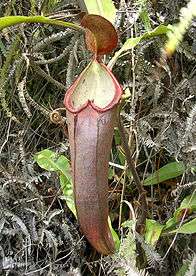






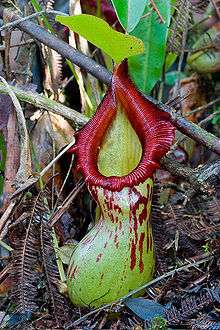



















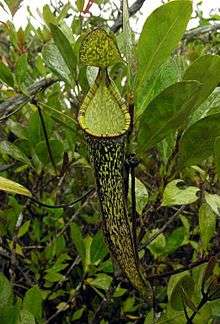


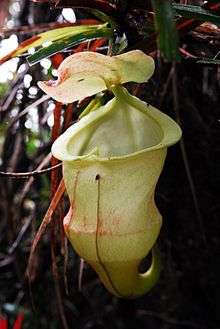




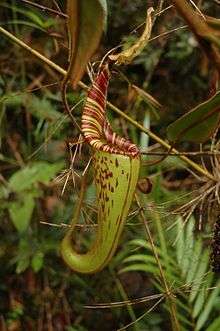
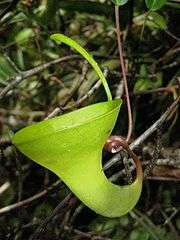











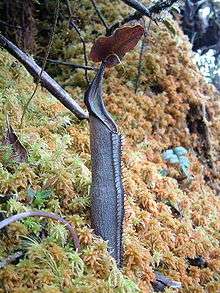
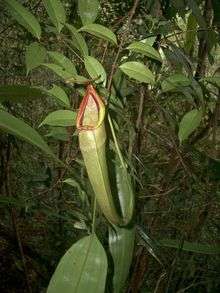

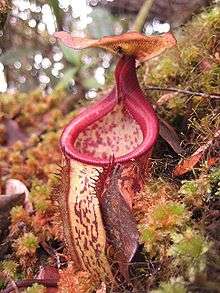










.jpg)



















































